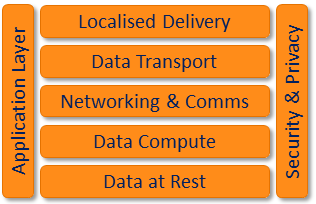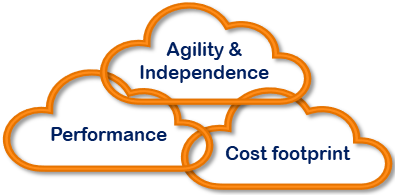 Time was when Cloud was simple: you did or you didn’t. If you did, there was a couple of big brands to choose between, and away it went. Not any more, at least not for anyone with a complex requirement, and there’s the rub: fewer and fewer firms have simple Cloud infrastructure requirements these days. The rising tides of application technologies and deployment intricacies are pushing the demands on Cloud further and further.
Time was when Cloud was simple: you did or you didn’t. If you did, there was a couple of big brands to choose between, and away it went. Not any more, at least not for anyone with a complex requirement, and there’s the rub: fewer and fewer firms have simple Cloud infrastructure requirements these days. The rising tides of application technologies and deployment intricacies are pushing the demands on Cloud further and further.
While more and more is put into hosted Cloud infrastructure, and firms increase online penetration into their businesses, the richness and functionality are calling for ever greater performance. At the same time as technology pressures and deployment are increasing, international complexities are growing from localised variations in data regulation and the demand for performance wherever the deployment.
These challenges are fuelling more and more niche services as lively innovation responds to the opportunities. All sorts of new, niche services are emerging in payments, specialist data processing and visualisation, artificial intelligence engines and data sets, storage silos, and compute power. The range of possibilities grows as different teams address different parts of the tech stack and see larger and richer use cases in servicing segments of the performance requirement.
All this presents firms with a dilemma as they work out where they should be heading and how. Their applications and infrastructure usage need more and more effort and expertise, and so does the business of identifying, building and managing the cloud services and infrastructure they need to run what they’re doing. Something has to change if the demands of building and running Cloud infrastructure aren’t to strangle the work and creativity needed to use it in the business.
This is where the new category of independent Cloud Integrators can contribute real value. Their skills lie in helping Cloud using, tech-enabled firms to identify the right mix of Cloud services needed to meet the objectives of the business, and then integrating those as a single infrastructure, delivering and managing it so that the teams in the business can concentrate on the business.
 Independence is central to the value and purpose of Cloud integrators so that the customer’s objectives are the true driver of the solution, and not some personal brand preference or particular commercial terms, as is the case with resellers. The truly independent Cloud integrator is the customer’s friend, opening up the range of possibilities and enabling choices to be made on suitability and best fit, not the products the reseller has decided to represent.
Independence is central to the value and purpose of Cloud integrators so that the customer’s objectives are the true driver of the solution, and not some personal brand preference or particular commercial terms, as is the case with resellers. The truly independent Cloud integrator is the customer’s friend, opening up the range of possibilities and enabling choices to be made on suitability and best fit, not the products the reseller has decided to represent.
While the independent Cloud integrator brings the infrastructure to life and maintains it in tip top condition, the customer’s internal team has the freedom to concentrate on the business and how that infrastructure is used to best effect. The Cloud integrator makes the difference, allowing the internal team to raise its game, using the best possible infrastructure, wherever it comes from.
Peter is chairman of Flexiion and has a number of other business interests. (c) 2021, Peter Osborn